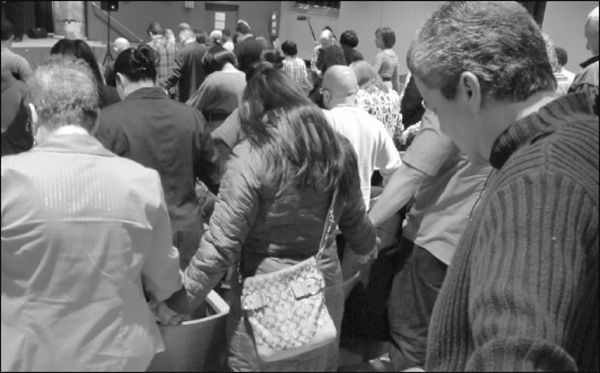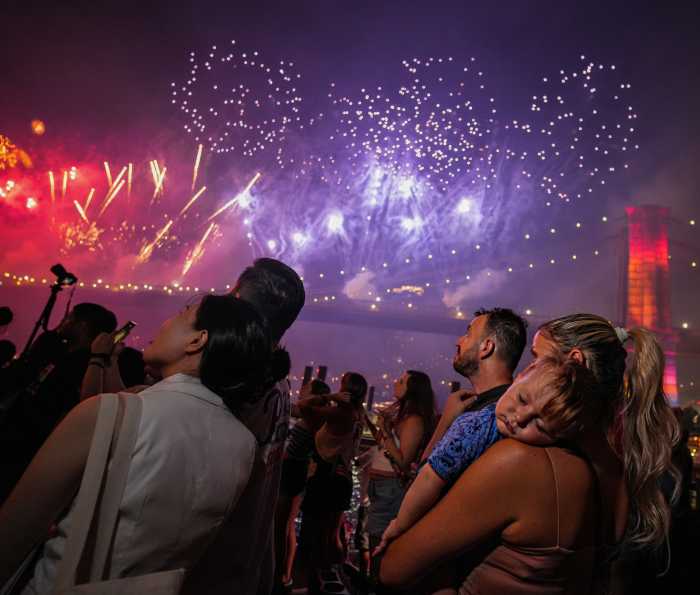 [/media-credit]
[/media-credit]
With the deadline looming for them to vacate the school, as a result of the city Department of Education’s new guidelines banning use of schools for worship services, the congregation had already secured a new space to meet on Sundays, in a Pentecostal church at 189 Madison St. However, the new location is smaller, with fewer seats.
The church’s head pastor, Joe Maldonado, is a charismatic figure with an inspiring story. As a child he was stricken with polio and recovered, though was left with a limp. Growing up in the LaGuardia Houses on the rough Lower East Side he was both a “serious handball player” and a gun-toting member of the area’s most notorious gangs. But he felt the call of religion and left the guns, and the handballs, behind.
Becoming a school safety officer, he was in charge of security for two dozen schools on the Lower East Side and in line to head school security for Manhattan. But again, he felt church’s pull, and dedicated himself to pastoring.
Speaking to the more than 100 congregants on Feb. 12, Maldonado said the L.E.S. Fellowship’s mere presence in the school had had a positive impact. Although the church didn’t do outreach to the school in any way, somehow its mere presence had an effect. The school had been in “disarray,” he said he was told by staff, teachers and parents. But after a year of the church’s meeting there on Sundays, “People started talking to each other.”
The service featured a choir, plus a humorous skit with a man getting conflicting advice from two women hovering over his shoulders, one dressed as a devil and the other an angel. There was also a tithe collection, in which members were urged to give 10 percent of their earnings to the church.
Mostly, Maldonado spoke in English, but occasionally, when relating folksy anecdotes, broke into Spanish, because he said, “It’s more passionate.”
“Oh yeah,” a woman in the audience called out in agreement.
Among the congregation was Benny Boom, the director of the movie “S.W.A.T.: Firefight.” Maldonado invited him onstage, saying it was no coincidence he returned from Hollywood.
“This is no mistake, Benny, that you came back to New York,” he told him. “The Lord orders our steps.”
Also seated in the auditorium was Councilmember Margaret Chin, who had been invited to attend. Chin was one of 30-plus councilmembers who co-sponsored a resolution calling on the state Legislature and the governor to sign legislation amending the state’s Education Law to allow houses of worship “maximum access” to school property during non-school hours.
On the other side of the issue, some opponents of churches in schools have noted with concern that certain churches bar participation by gays and lesbians. But Maldonado said the L.E.S. Fellowship is open to all. He said he had been queried recently on his church’s stance on this point, and had responded, “Don’t you understand? If we accept prostitutes and pimps and backsliders and pedophiles — I want you to know, if God accepts them — we accept the homosexuals.”
“Amen!” came a call from the audience, and “Yes!”
In a subsequent phone interview, the pastor said that a “transsexual” who had been rejected by all the other local churches joined the L.E.S. Fellowship and eventually became straight. This won’t necessarily happen in every case, he said — it’s all up to God.
The church is basically a much-needed spiritual “hospital” for the community, serving anyone in distress, he said. He’s proud to call himself “The People’s Pastor.”
At his sermon’s end, Maldonado indicated he disagreed with D.O.E.’s ruling, which adheres to the fundamental principle of separation of church and state.
“There’s a higher power than the law,” the pastor declared to his followers. “The letter of the law is demanding, people. The letter of the law kills. But the Lord is mercy. There is life on the Lower East Side. This is not the end — this is only the beginning. The best is yet to come.”
The congregation applauded.
Michael Hu, a self-described “China Rican” who grew up at 60 Pitt St., said the worshipers are hooked on Maldonado and his message.
“We love the way he preaches and the love that he shows,” said Hu, who works in heating and air conditioning.
The pastor said the church paid $1,500 a month for the school auditorium, with most of that going to pay for a required security guard. Where they’re going now, the rent is a little less, but the space is smaller, too. The school auditorium offered more than 200 seats, while the new space has just 125. They hope they won’t have to turn away people interested in joining.
After the service, Chin said, experiencing it just reinforced her position.
“I support the Council resolution,” she said. “The causes, families being here, just people coming together. The school is a community facility and should be open to the community.”
In an interview a few days before the service, Chin — who attended Catholic school in Hong Kong — said, churches should have the same access to public schools as any other nonprofit group, as long as it’s during non-school hours. The churches do good work in the community and should be supported, she said.
The school is just inside the border of Chin’s district. Councilmember Rosie Mendez, who represents the adjacent district, did not sign the Council resolution.
Assembly Speaker Sheldon Silver also had serious concerns about churches using schools. He said that “regularity” of services — on every Sunday — posed a problem, in that it establishes a presence, but that specific events, such as a Passover Seder dinner, for example, could be permitted. Maldonado said the church does plan to hold its Christmas service in P.S. 137.
Also, Silver said, the fact that schools are primarily only available for groups to use during the day on Sundays means that religious groups that don’t observe their Sabbath then, such as Jews and Muslims, are effectively excluded.
Pedro Cardi, an associate pastor at the church, said he had taken petitions of support for keeping the church at P.S. 137 up to Silver’s office in Albany, but was unable to meet with him. Judy Rapfogel, Silver’s chief of staff, said she had taken phone calls from Cardi and was impressed by how gentlemanly he was, but that an appointment is needed to see the speaker. However, she said, the speaker’s staff had definitely been meeting with representatives of various church groups regarding the issue of churches in the schools.
Silver also expressed concern about churches leaving pamphlets behind in schools after their services. But as Cardi talked to a reporter after the service, a church officer was going through the aisles, picking up left-behind informational fliers. The fliers had the address of next Sunday’s service at the new location, plus information on other weekday prayer services and meetings the group conducts at other scattered locations around the neighborhood. Cardi admitted sometimes a few fliers might have been left behind.
In addition, on Sun., Feb. 12, the church’s banner could be seen hanging prominently on the school’s front door. At first glance, the main image one perceived in the banner was a large soaring eagle on its right side. But upon closer inspection, the faint image of a large cross could be seen in the sky on the sign’s left side.
Although the state Senate passed a bill allowing churches to use public schools for worship services, the Assembly never did its own version, so the Legislature ultimately did not modify the existing law. Advocates for churches in schools are currently appealing a court decision backing the Department of Education’s position.
In a statement on Feb. 16, Silver said, “Since this is a constitutional issue, it is appropriate that this is being addressed in the courts. We look forward to the court’s ultimate determination to help guide any further action.”



































